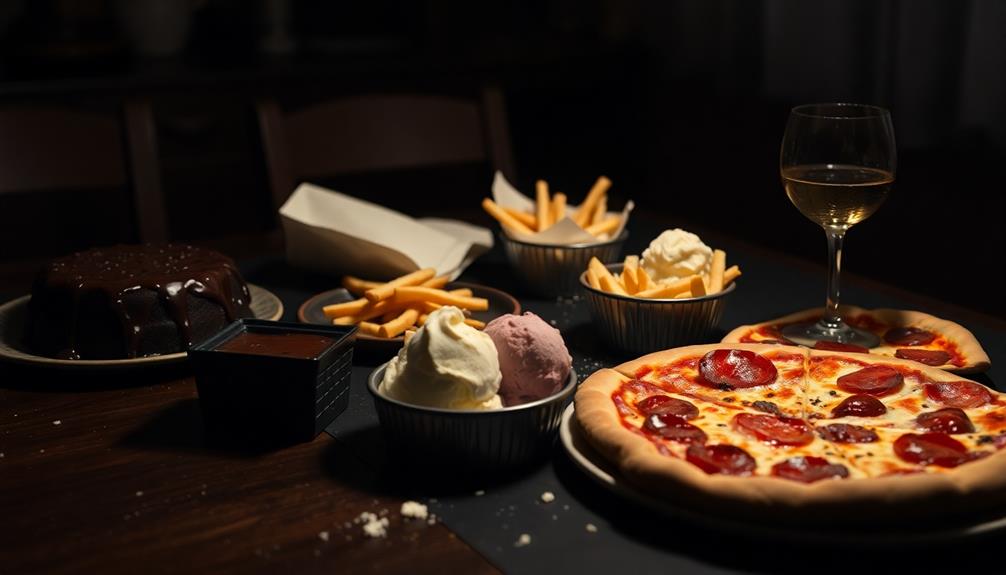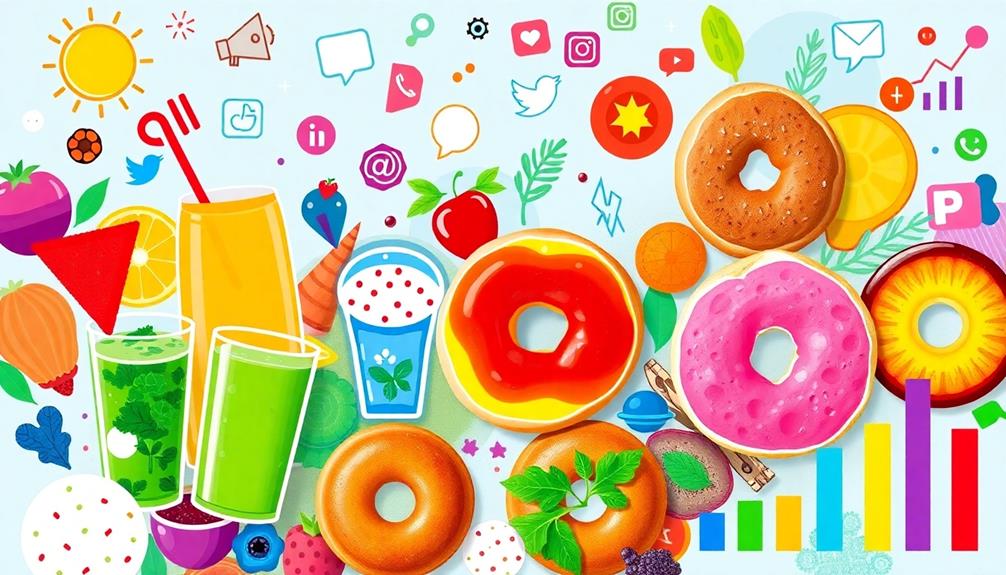Certain foods are called "guilty pleasures" because they spark both indulgence and feelings of shame. You might enjoy a cheesy pizza or a rich chocolate dessert but later feel guilty, shaped by societal norms that prioritize health and moderation. This guilt complicates your relationship with food, leading to emotional eating or bingeing. The language we use also plays a role, labeling some foods as "bad" and creating negative associations. By understanding these influences, you can start to enjoy your favorites without guilt. If you're curious about ways to shift these perceptions, there's more to explore on this topic.
Key Takeaways
- Cultural narratives often label indulgent foods as "bad," creating a sense of guilt when consuming them despite their enjoyment.
- Societal standards around body image and health promote feelings of shame associated with certain foods, reinforcing the guilty pleasure concept.
- The emotional turmoil from guilt can lead to unhealthy eating patterns, causing a cycle of bingeing and restriction.
- Language surrounding food, such as "guilty pleasure," shapes perceptions and emotions, contributing to negative associations with indulgent treats.
- Mindfulness practices can help reframe the enjoyment of these foods, reducing guilt and promoting a healthier relationship with eating.
Definition of Guilty Pleasures
Guilty pleasures in food are those indulgent treats you love but often feel ashamed to enjoy. The term "guilty pleasures" implies a moral judgment about what you choose to eat, labeling certain foods as "bad." This dichotomy can create anxiety around eating, making you feel like you're constantly trying to balance pleasure with guilt.
For instance, delicious diner classics like a Loaded Baked Potato or crispy Onion Rings might tempt you, yet they often come with feelings of guilt. You might find yourself caught in a cycle of restriction and bingeing, where the very act of indulging triggers negative emotions.
When you think about guilty pleasures, societal pressures and personal beliefs about diet and body image play a significant role. Terms like "cheat foods" only add to the guilt, leading you to enjoy your favorite treats less.
The language surrounding food shapes how you perceive it, often detracting from the simple joy of eating.
Cultural Influences on Food Choices
The way you perceive food is heavily influenced by cultural narratives that shape your beliefs about indulgence. These narratives often label certain foods as "guilty pleasures," reinforcing the idea that enjoying them is somehow morally wrong. This stigma can lead to complex feelings about what you eat.
For instance, Brazilian cuisine showcases a blend of flavors and ingredients, where the celebration of rich dishes like Caldeirada reflects a cultural appreciation for indulgence.
Different cultures have unique views on indulgence, which can affect your relationship with food. For instance:
- Celebration of Flavor: Some cultures embrace rich, flavorful dishes as part of their heritage, celebrating indulgence rather than shaming it.
- Minimalism: Others promote a more minimalist approach, emphasizing health and moderation, which can lead to feelings of guilt when indulging.
- Historical Context: The idea of gluttony often carries negative moral judgments, influencing how you perceive excessive consumption.
Terms like "sinful" or "forbidden" foods further cement the idea of guilty pleasures in your mind.
Societal standards around body image and diet also dictate what's deemed acceptable or taboo. Maneuvering through these cultural influences can complicate your choices and feelings about food, making indulgence a conflicted experience.
Psychological Effects of Guilt
Feeling guilty about food choices can create a whirlwind of negative emotions that complicate your eating habits. When you label certain foods as guilty pleasures, this moralization can instill feelings of shame and anxiety, making it harder to enjoy what you eat.
For instance, indulging in a flavorful dish like Mushroom Masala might be seen as wrong when guilt is involved, despite its vegetarian-friendly nature and rich spices. Guilt often leads to unhealthy eating patterns—restricting yourself from indulging can result in bingeing later on, trapping you in a cycle of deprivation and overindulgence.
These emotional responses can distort your body image and lower your self-esteem, reinforcing disordered eating behaviors. You might find that the more guilt you feel, the more pleasure you derive from those indulgent foods, complicating your relationship with them.
This dynamic can hinder the development of a healthy mindset around eating, where enjoyment and self-discipline can coexist.
Ultimately, it's essential to recognize how guilt influences your choices and fosters conflict between satisfaction and restraint. Understanding these psychological effects can empower you to break free from the cycle of guilt and embrace a more balanced approach to food, allowing you to enjoy your guilty pleasures without the accompanying emotional turmoil.
Language's Role in Food Perception
Words can wield immense power over how you perceive food, shaping your beliefs and emotions around what you eat. When you hear terms like "cheat" or "forbidden," it creates negative associations that can lead to guilt and anxiety, making your food choices feel like moral dilemmas.
Comfort foods, such as fried pork chops, often fall into this category, where enjoyment is overshadowed by guilt. This dichotomy of "good" versus "bad" foods not only stresses you out but can also exacerbate unhealthy eating behaviors.
To foster a healthier relationship with food, consider these three strategies:
- Reframe your language: Use neutral terms instead of negative descriptors. For example, call a dessert "an enjoyable treat" rather than a "cheat."
- Focus on enjoyment: Emphasize the pleasure of eating, allowing yourself to indulge without guilt.
- Practice self-compassion: Remember that food is meant to be enjoyed, and it's okay to savor your favorites.
Eating Habits and Mental Health
Guilt can seriously affect your eating habits, pushing you into emotional eating patterns that mightn't serve you well.
Certain dishes, such as Red-Braised Pork Belly, can evoke feelings of nostalgia and comfort, making them tempting choices during stressful times.
When you stress over what you eat, it often leads to a cycle of indulgence and shame, distorting your relationship with food.
Practicing mindfulness with your food choices can help you break this cycle and foster a healthier mindset around eating.
Guilt's Impact on Eating
Steering through the complex emotions surrounding food can be challenging, especially when guilt creeps in. That guilt often leads to negative emotional responses, causing you to stress and seek comfort in certain foods. For some, this might mean turning to traditional dishes like Yekolo (Roasted Barley) or indulging in a sweet treat like Tej, which can both provide comfort and complicate feelings around guilt.
This cycle of restriction and bingeing can harm your relationship with food, making it tough to enjoy meals without negative feelings.
Here are three key impacts of guilt on your eating habits:
- Disordered Eating Patterns: Guilt surrounding specific foods can reinforce shame and low self-esteem, contributing to unhealthy eating behaviors.
- Distorted Body Image: When you associate your self-worth with what you eat, it distorts your perception of body image, making indulgence feel like a failure.
- Emotional Turmoil: Perceived dietary failures only amplify feelings of guilt, complicating your relationship with foods even further.
To combat this, experts recommend reframing your language around food and practicing self-compassion. By shifting your mindset, you can reduce the psychological impact of guilt on your eating habits, allowing yourself to enjoy food without the weight of negative emotions.
Emotional Eating Patterns
Food often serves as more than just sustenance; it can become a source of comfort during emotional highs and lows. When you're feeling stressed or anxious, you might turn to what you consider a guilty pleasure. This guilty pleasure is something that provides immediate comfort but can also lead to feelings of guilt and shame afterward.
For instance, indulging in rich dishes like Nettle and Potato Soup can provide warmth and satisfaction, yet may also trigger complex feelings about food choices. The cycle often begins when you label certain foods as "bad," which can distort your relationship with food.
These emotional eating patterns often stem from a need to cope with negative emotions. When you indulge, it might feel good temporarily, but it can also reinforce disordered eating habits. This might lead to bingeing after periods of restriction, creating a vicious cycle of guilt and shame.
Research shows that labeling foods as guilty pleasures amplifies these feelings, heightening your emotional responses and leading to unhealthy eating behaviors.
To improve your emotional well-being, consider reframing your food choices. By moving away from guilt and shame, you can foster a more balanced mindset, allowing yourself to enjoy all foods without negative emotions taking over.
This shift can be key in promoting healthier eating habits and enhancing your overall mental health.
Mindfulness and Food Choices
Amid the hustle and bustle of daily life, practicing mindfulness in your eating habits can transform your relationship with food. When you focus on the present moment, savoring each bite becomes a rewarding experience rather than a source of guilt. This shift helps you enjoy your meals fully and reduces anxiety about your food choices.
For instance, indulging in a delightful treat like Dorayaki (Red Bean Pancake) can enhance your experience when you take the time to appreciate its fluffy texture and sweet filling.
Here are three ways to integrate mindfulness into your eating habits:
- Savor Each Bite: Take time to appreciate the flavors, textures, and aromas of your food. This enhances enjoyment and fosters a deeper connection to what you're eating.
- Listen to Your Body: Pay attention to your hunger and satisfaction cues. Mindfulness allows you to recognize when you're full, helping you avoid overeating and the guilt that often follows.
- Practice Self-Compassion: Allow yourself to enjoy all foods, including those guilty pleasures. This mindset reduces shame and creates a healthier relationship with food.
The Concept of Moderation
Moderation plays an essential role in enjoying guilty pleasure foods without the burden of guilt. When you allow yourself to indulge in these foods occasionally, you prevent the cycle of restriction and bingeing that often arises when you label foods as "good" or "bad."
For example, enjoying a slice of pumpkin roll during the holidays can be a delightful experience that enhances your celebration. Research shows that regular indulgence can actually reduce cravings and lower the chances of overeating, promoting a healthier relationship with food.
Practicing moderation means you can savor each experience mindfully, enhancing your overall satisfaction and reducing food-related anxiety. Instead of feeling guilty about enjoying a slice of cake or a handful of chips, you can embrace these moments with a positive mindset.
A flexible approach to your food choices fosters self-acceptance and encourages you to enjoy a diverse range of foods. By prioritizing moderation over strict rules, you'll find it easier to appreciate your favorite treats without guilt.
Redefining Food Enjoyment
Shifting your mindset around food can dramatically enhance your overall enjoyment of meals and snacks. When you stop labeling foods as "good" or "bad," you free yourself from the guilt often attached to indulgent choices. This shift not only improves your mental health but also promotes a healthier relationship with food.
For instance, indulging in delightful treats like Kue Putu (Bamboo Rice Cake) or Dadar Gulung can bring joy and comfort, reminding you of the rich flavors that traditional desserts offer.
Here are three ways to redefine your food enjoyment:
- Ditch the Negative Language: Instead of calling certain foods "guilty pleasures," think of them as enjoyable treats. This change in perspective helps reduce shame associated with eating.
- Practice Mindful Eating: Savor every bite of your favorite foods. By being present and appreciating the flavors, you elevate your food experience, making it more satisfying.
- Embrace Moderation: Allow yourself to enjoy all types of foods without guilt. Moderation fosters balance and counters the urge to overindulge when you finally allow yourself that "forbidden" treat.
Alternatives to Restrictive Dieting
When it comes to achieving a balanced diet, ditching restrictive dieting can be a game changer for your relationship with food. Instead of cutting out entire food groups, focus on a flexible approach that allows for moderation. This means you can enjoy your favorite 'guilty pleasure' foods without the feelings of guilt that often accompany indulgence.
Research shows that including these foods consistently can actually reduce cravings and lower the chances of binge eating, as you feel less deprived.
Mindful eating practices are key here. Savor each bite and listen to your hunger cues, which helps you enjoy your meals more fully. You can also adopt a plant-based diet that accommodates occasional treats, giving you the nutritional benefits of fruits and vegetables while still satisfying your cravings.
Education about the psychological impacts of food-related guilt can further shift societal narratives. By accepting diverse food choices, you can reduce stigma around indulgence and embrace a healthier relationship with all foods.
This approach not only nurtures your body but also your mind, leading to a more positive and satisfying dining experience.
Expert Insights on Eating
Experts highlight the importance of understanding the psychological impacts of our food choices. When you label certain foods as "guilty pleasures," it can lead to negative emotions and unhealthy eating behaviors.
Dr. Traci Mann emphasizes that forbidding yourself from enjoying specific foods only increases cravings for them. Instead of feeling guilty about indulging in these treats, consider these insights:
- Neutralize Your Language: Reframing how you talk about food can help reduce feelings of guilt. Instead of "I'm cheating," think "I'm enjoying something I love."
- Embrace Enjoyment: When you allow yourself to indulge without judgment, you foster a healthier relationship with food. This shift can lead to greater satisfaction and less binge eating.
- Focus on Balance: Aim for a balanced approach to eating. Include guilty pleasures in moderation, and they won't feel like forbidden fruit.
Shifting Perspectives on Food
The way you think about food can greatly influence your eating habits and overall relationship with what you consume. When you label certain foods as "guilty pleasures," it creates unnecessary shame and a harmful good-versus-bad mindset. Instead, shifting your perspective can empower you to enjoy all foods without guilt.
| Old Perspective | New Perspective | Impact |
|---|---|---|
| Forbidden Foods | Indulgent Foods | Encourages enjoyment |
| Good vs. Bad | Balance and Moderation | Supports variety |
| Guilt and Shame | Celebration | Reduces anxiety |
Frequently Asked Questions
Is Eating Junk Food a Guilty Pleasure?
Eating junk food can feel like a guilty pleasure for you. You might enjoy it, but societal pressures often make you feel conflicted. Balancing enjoyment without guilt can lead to a healthier relationship with food.
Where Does Food Guilt Come From?
Food guilt often arises from societal pressures, cultural norms, and marketing that frame certain foods as "bad." You internalize these messages, leading to feelings of shame when indulging, which can disrupt your relationship with food.
What Is an Example of Guilty Pleasure?
A classic example of a guilty pleasure is chocolate cake. You can't resist its rich taste, but you often feel guilty afterward, knowing it's loaded with sugar and calories that don't align with your health goals.
Can Chocolate Be a Guilty Pleasure?
Chocolate can certainly be a guilty pleasure, enticing with its creamy, enchanting cocoa. You savor each bite, yet wrestle with whispers of worry about weight and wellness, battling between indulgence and restraint in every delicious moment.
Conclusion
In the end, it's time to let go of the guilt that clings to your favorite foods. Instead of viewing them as indulgences, see them as moments of joy that nourish your spirit. Remember, life's too short to deny yourself simple pleasures; savor every bite without shame. By shifting your perspective, you can embrace a healthier relationship with food—one that celebrates enjoyment rather than restriction. After all, happiness is just as essential to your well-being as nutrition.










